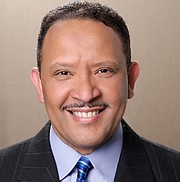Criminalizing poverty
Marc H. Morial | 9/27/2018, 6 a.m.
Kalief Browder, a teenager who spent three harrowing years in a New York City jail on charges that eventually were dropped, took his own life as a result of the trauma he suffered.
Sandra Bland, an activist who spoke out against police brutality, died in a jail cell in Texas, arrested after a traffic stop for changing lanes without a signal.
Jeffrey Pendleton, arrested on a misdemeanor marijuana possession, died after five days in a New Hampshire jail cell.
Our nation’s racially discriminatory cash bail system has left hundreds of nonviolent misdemeanor suspects to die in jail while awaiting trial, simply because they are poor.
A 2015 study identified more than 800 deaths in local jails and lockups. More than 75 percent of those in local jails have not been convicted, and 70 percent of those awaiting trial are detained for nonviolent offenses.
The unfair cash bail system destroys lives in other ways. Flozell Daniels Jr., CEO and president of Foundation for Louisiana, recently told the story of Nicole, a New Orleans mom who was arrested after forgetting to pay a ticket for failure to wear a seatbelt. She spent a month in Orleans Parish jail, separated from her children, losing her job and costing the taxpayers thousands of dollars.
There are hundreds of parents accused of nonviolent misdemeanors, like Nicole, in Louisiana alone. There are thousands across the nation.
A report Mr. Daniels co-authored, “From Bondage to Bail Bonds: Putting a Price on Freedom in New Orleans,” found that the money bail system takes $6.4 million from New Orleans families each year, 85 percent of it paid by black people, many of whom are accused of nonviolent misdemeanors.
Mr. Daniels and his co-authors wrote:
“Money bail ensnares people in a system in which one’s freedom hangs on the ability to pay and removes people who are important to their families and communities. The money paid to secure a person’s freedom is not available for other essentials, thus over-burdening family and community support structures. Those who can’t pay, or stay in jail even a few days before they can gather the money, are put at increased risk of losing their employment and housing and of being re-arrested than if they had not been detained. They are subject to the degradation, violence, and trauma … Indeed, even when people purchase their freedom through a commercial bail bond they live in fear because the bondsman has the power to seize and surrender them at will.”
It doesn’t have to be this way. Weeks ago, California became the first state to end cash bail. Washington, D.C., has a cashless bail system.
Socially conscious innovators are finding technology-based solutions to help people navigate the cash bail system. Jay-Z, who celebrated Father’s Day last year by posting bail for dads, has invested in Promise, an app that provides clients with financial assistance with bail costs, along with other services to get people out of jail. Another app, Help Bond Me, allows detainees to crowd-fund their bail.
These efforts should be applauded, but we look forward to the day when they are no longer needed. Jailing nonviolent misdemeanor suspects who can’t afford bail doesn’t make our communities safer. It just exacerbates inequality and burdens taxpayers.
We need to live up to the American ideal of equality under the law for the rich and poor alike, as enshrined in the 14th Amendment to the U.S. Constitution. Debtors’ prisons were abolished in 1833, but 185 years later, the criminalization of poverty persists.
The writer is president and chief executive officer of the National Urban League.









